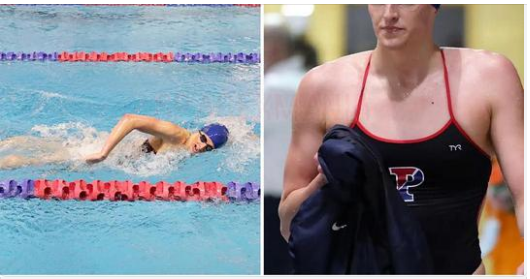
Lia Thomas, a well-known swimmer, made the unexpected and intensely emotional decision to give up competitive swimming, citing an emotionally taxing journey and a sense of loneliness in a statement posted yesterday. Thomas, a transgender athlete, has served as the focal point of many discussions about fairness, gender, and the integrity of competition in women’s sports.
Lia’s statement reads: “The waters have been turbulent, not due to the physical demands but the constant battle to seek acceptance and fairness in a sport I adore. No athlete should feel isolated or singled out for their identity rather than recognized for their achievements.”
Her decision to retire follows months of heated debates about transgender athletes in women’s sports. She has highlighted the challenges faced by transgender athletes, both in their sports and in society, through her journey marked by public scrutiny, policy debates, and ethical questions.
Supporters of Thomas argue that her retirement is a significant loss for the sport and underscores the need for a compassionate and inclusive approach for athletes navigating their careers amidst complex identity discussions. Critics, however, have questioned her accomplishments, citing alleged physiological advantages.
The sports world must now consider the ethical, biological, and societal factors surrounding transgender athletes. Thomas’s retirement prompts us to reflect on how this moment will shape the future of competitive sports and the experiences of future athletes. Her decision is more than personal; it is a call for a communal reflection on the opportunities, acceptance, and spaces provided for all athletes, regardless of gender identity.
Thomas’s story emphasizes the need for the international athletic community to create a fair and respectful environment that upholds competition integrity while welcoming diverse identities. This challenge extends to all athletes, including transgender individuals.
The pressing question remains: how can inclusivity and fairness be balanced in a field traditionally divided along biological lines? Thomas’s experience highlights the need to review sporting regulations, especially regarding gender identity and biological differences. Recognizing that past policies may not be suitable for today’s athletes could unite her supporters and critics.
The discussion around this issue requires a rigorous, objective, and empathetic evaluation, involving experts from endocrinologists to ethicists, players to administrators. The conversation about transgender athletes must consider their biology and right to compete.
Lia Thomas’s journey has inspired passionate support and sharp skepticism. Some emphasize the psychological and physical effects of transitioning, while others argue that transgender women may have physiological advantages over cisgender women.
Amid the scientific, moral, and competitive dimensions, there is a fundamentally human element: respect and empathy for all athletes, acknowledging their challenges and achievements.
Thomas’s departure raises critical questions requiring an intersectional approach that balances inclusivity and fair competition. This includes considering hormone levels, physical traits, and their potential impacts on competitive advantages or disadvantages. These complex questions demand nuanced answers.
We witness an athlete who reached the pinnacle of success but faced scrutiny and controversy over her right to compete. Thomas’s announcement and retirement provide a profound opportunity for reflection beyond sports.
The impact of Thomas’s withdrawal will be felt throughout the sports community, urging athletes, governing bodies, and fans to foster a culture that celebrates all athletes for their dedication, talent, and achievements, free from exclusion or bias.





